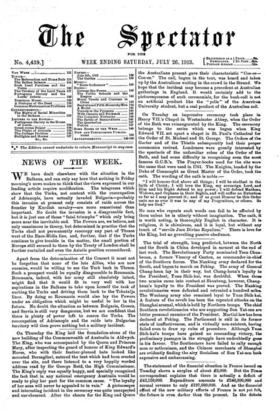The trial of strength, long predicted, between the North and
the South in China developed in earnest at the end of last week. The Revolutionary Party nominated Tsen Chun- hsuan, a former Viceroy of Canton, as commander-in-chief of the Southern forces. The Nanking army declared for the South, and began to march on Peking. The army of General Chang-hsun lay in their way, but Chang-hsun's loyalty to the President, Yuan Shih-kai, was doubtful. When these two armies came into contact at Shantung, however, Chang- hsun's loyalty to the President was proved. The Nanking revolutionaries were defeated and retreated a hundred miles. The Wuchang army also remained loyal to Yuan Shih-kai. A feature of the revolt has been the repeated attacks on the Shanghai arsenal, which is held by Northern troops. The chief Southern revolutionaries who are supporting Sun Yat-sen are bitter personal enemies of the President. Martial law has been declared at Peking. The Parliament is still in its former state of ineffectiveness, and is virtually non-existent, having failed even to draw up rules of procedure. Although Yuan Shih-kai's troops have gained no resounding victory, the preliminary passages in the struggle have undoubtedly gone in his favour. The Southerners have failed to rally enough men or enthusiasm, and the Chinese merchants of Shanghai are evidently finding the airy Socialism of Sun Yat-sen both expensive and embarrassing.










































